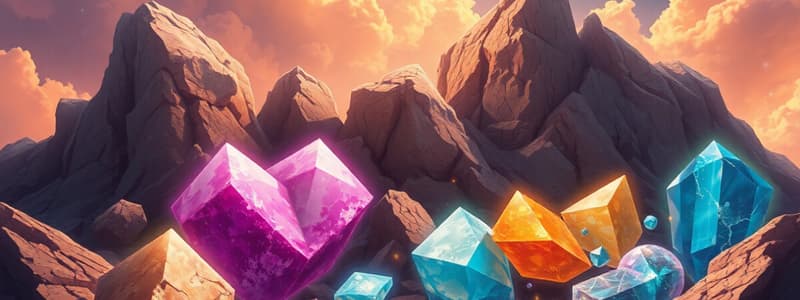Podcast
Questions and Answers
What is the general color range of augite?
What is the general color range of augite?
- Diamond-shaped
- Dark green to black (correct)
- Yellow-green to translucent
- Pink to red
Which mineral typically forms longer, thinner, and shinier crystals than augite?
Which mineral typically forms longer, thinner, and shinier crystals than augite?
- Olivine
- Mica
- Quartz
- Hornblende (correct)
What is the primary occurrence of olivine in igneous rocks?
What is the primary occurrence of olivine in igneous rocks?
- As crystalline masses
- In layered deposits
- As diamond-shaped crystals
- As rounded grains (correct)
What kind of rocks are formed by the cooling and solidification of molten rock material?
What kind of rocks are formed by the cooling and solidification of molten rock material?
What are sedimentary rocks primarily a product of?
What are sedimentary rocks primarily a product of?
What forms clastic sedimentary rocks?
What forms clastic sedimentary rocks?
What leads to the metamorphosis of rocks into metamorphic rocks?
What leads to the metamorphosis of rocks into metamorphic rocks?
Which of the following describes the crystalline structure of hornblende?
Which of the following describes the crystalline structure of hornblende?
What is the property of minerals that describes their ability to break along parallel planes?
What is the property of minerals that describes their ability to break along parallel planes?
Which of the following minerals is characterized by a glassy appearance and can vary in color from white to smoky?
Which of the following minerals is characterized by a glassy appearance and can vary in color from white to smoky?
Which mineral exhibits distinct cleavage and is typically dull to opaque?
Which mineral exhibits distinct cleavage and is typically dull to opaque?
What term describes the quality and intensity of reflected light from a mineral surface?
What term describes the quality and intensity of reflected light from a mineral surface?
Which type of rock is dominated by silicon and oxygen, typically resulting in a light color?
Which type of rock is dominated by silicon and oxygen, typically resulting in a light color?
Which mineral is known for its tendency to break into thin sheets or flakes?
Which mineral is known for its tendency to break into thin sheets or flakes?
Which group of minerals is predominantly found in mafic rocks and has a dark color?
Which group of minerals is predominantly found in mafic rocks and has a dark color?
Which mineral is recognized for having a unique color and is always green?
Which mineral is recognized for having a unique color and is always green?
Flashcards are hidden until you start studying
Study Notes
Rock Building Blocks
- Minerals are crystalline, inorganic substances with unique physical properties.
- Hardness measures resistance to abrasion.
- Luster describes the quality and intensity of reflected light from a mineral.
- Color can be a unique identifier for some minerals, but variance is common.
- Cleavage refers to the tendency of a mineral to break along parallel, smooth planes.
- Fracture refers to the tendency of a mineral to break along irregular, non-planar surfaces.
Common Rock-Forming Minerals
- Quartz is hard, glassy-looking, and can be transparent or translucent.
- Feldspar is dull, opaque, and porcelain-like, with colors ranging from red to green.
- Mica is easily separated into thin sheets and can be white (muscovite) or black (biotite).
- Pyroxene is dark green to black and often forms short, stubby crystals.
- Amphibole crystals are longer, thinner, and shinier than pyroxene.
- Olivine is yellow-green, translucent, and glassy-looking; not commonly found as crystals.
Rock Types
- Igneous rocks form from the solidification of molten rock.
- Extrusive igneous rocks solidify at the surface from lava.
- Intrusive igneous rocks solidify below the surface from magma.
- Sedimentary rocks are formed from weathering and erosion of existing rocks.
- Clastic sedimentary rocks are composed of fragments of other rocks.
- Chemical and organic sedimentary rocks form by precipitation from solutions or organic processes.
- Metamorphic rocks are formed from existing rocks transformed by heat and pressure.
The Rock Cycle
- Rocks are constantly being transformed through processes like weathering, erosion, deposition, heat, and pressure.
- This cycle creates a continuous loop of creation and transformation of rocks.
Studying That Suits You
Use AI to generate personalized quizzes and flashcards to suit your learning preferences.




